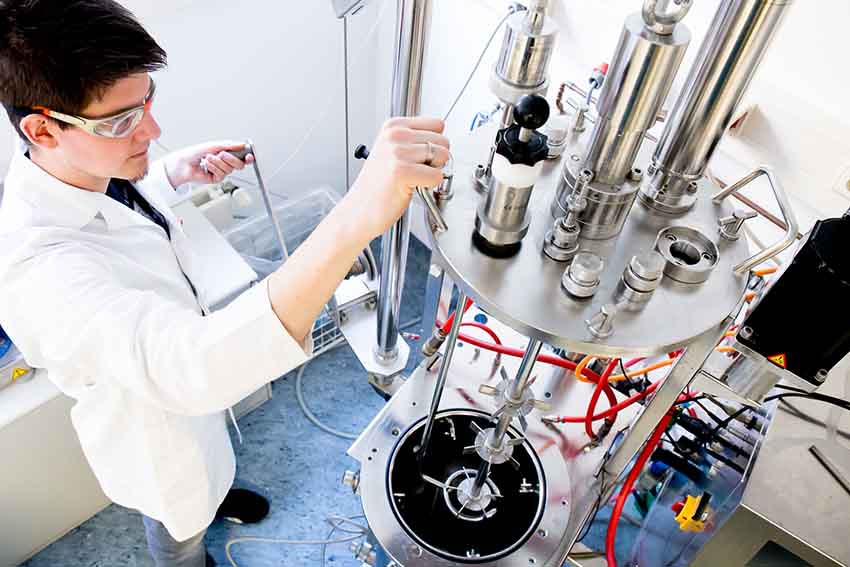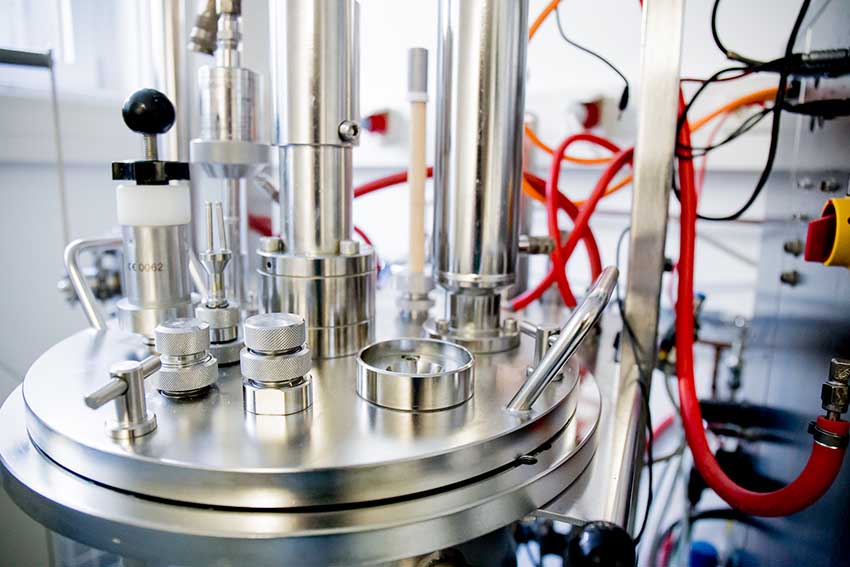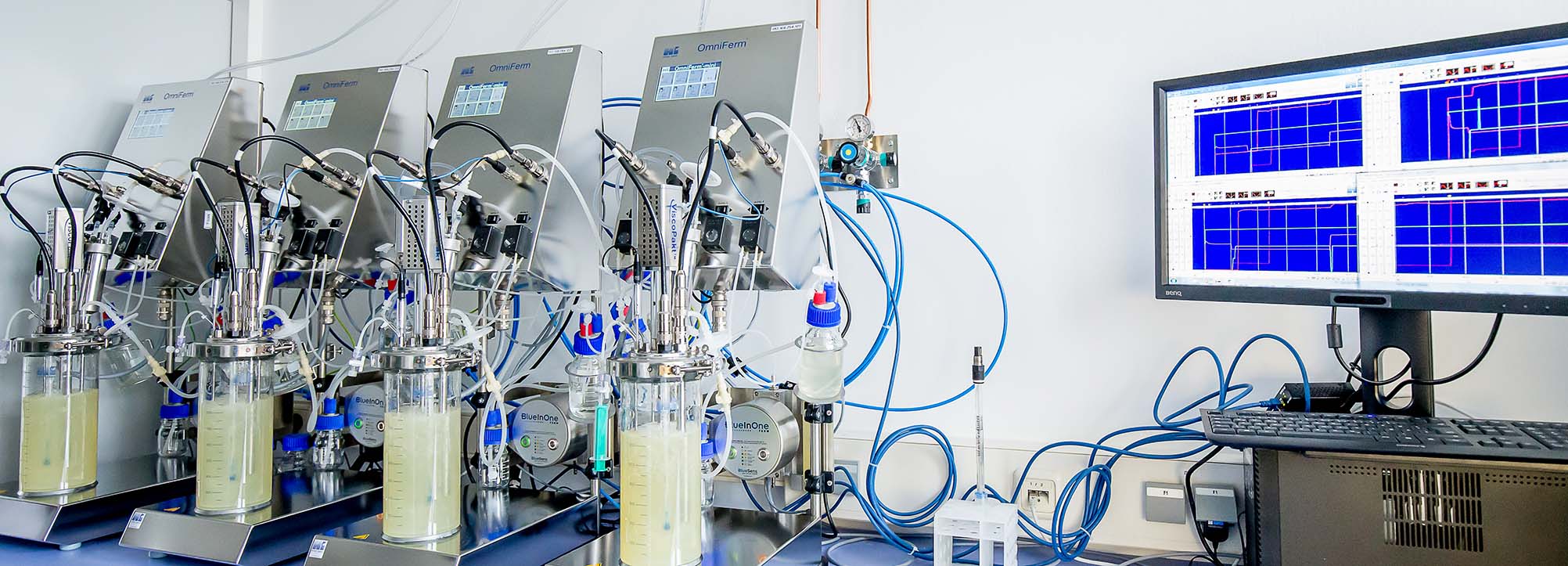Enzymicals is a leading German specialist in the field of white biotechnology with more than a decade of experience. Their mission is to create breakthrough bio-based solutions for the chemical and pharmaceutical industry and to be the specialist for implementing cost-efficient enzymatic processes for sustainable production. For achieving this, the company supports the global industry with technologies, products and offerings for the implementation of biocatalysis.
Enzymicals calls it “the biologicalization of the industry”: using biological principles in technology, as well as employing biotechnological manufacturing processes and/or the processing of bio-based raw materials. This is clearly one of the most important technological drivers of our time.
Enzymicals are people that truly believe in the benefits of cell free biosynthesis and to use this concept to produce diverse consumer products. The team is set up to fulfill clients’ needs for efficient biocatalytic solutions. Two equal groups work on biological and chemical topics and represent the necessary know-how in analytics, molecular biology, fermentation, biocatalysis, and process chemistry.
Altogether, the activities of the company can be summarized with promoting sustainable industrialization with enzyme-based biochemical synthesis.
Interview with Dr. Erik de Vries, CEO of Enzymicals AG.

Easy Engineering: What are the main areas of activity of the company?
Erik de Vries: If new manufacturing processes were the foundation of the original industrial revolution, ‘biomanufacturing’ will be the bioeconomy’s equivalent. With our platform for the development and piloting of biocatalytic synthesis routes we built a much-needed bridge between academic research and industrial application. In this context, we add value with tailor-made enzymes, customized chemicals and individual process solutions and enable greener and safer manufacturing procedures.
At Enzymicals we work as a partner on developing and/or manufacturing desired products, be it a biocatalyst or a chemical target such as a pharmaceutical, a cosmetic, or a flavor ingredient. From first idea to final product, we manage contract manufacturing services for delivering complex chemistry projects at the quality needed, when it is needed. With complete technology transfer packages and production partnerships, we support scale up and direct technical transfer of a process to manufacturing sites. Over the years, we have taken numerous products to commercialization and we are proud of being a well-known name in this field and a reputable experienced partner for industrial biocatalysis from gram to ton scale.
E.E: What’s the news about new products?
E.V: Enzymicals places a clear focus on research and development, making contract research the main product of our company. Our core expertise includes the identification, optimization, application and large-scale production of enzymes. A unique selling proposition of Enzymicals is the ability to develop enzyme-based processes under industrial conditions, to scale them to the kg scale, to demonstrate the economic feasibility and ultimately to accompany our customers to commercial implementation. We are constantly developing new catalysts and testing their application in innovative synthesis routes. Besides developing biocatalysis, we also see an increase in revenue coming from the production and purification of diagnostic enzymes, determining enzyme kinetics to better understand their biocatalytic performance, and our gene cloning and expression services. However, as we do this mainly in B2B operations, it cannot be presented publicly.

Public and new is that we formed a cluster with the technologically complementary SMEs Chiralvision, Aminoverse and Candidum to jointly offer complex development projects spanning from in-silico catalyst discovery over AI-supported enzyme engineering to DOE-based process intensification and scale-up. We are just now starting to go public with this “one stop shop” cluster and its value proposition and have already received great feedback.
E.E: What are the ranges of products?
E.V: Enzymicals operates an active catalogue business with about 50 unique biocatalysts from diverse enzyme classes (available from abcr.com). These catalysts are compiled to reflect an available biocatalytic diversity and to support initial proof-of-concept studies. If off-the-shelf products are not fit for purpose, we offer screening of substantially larger enzyme panels, bespoke second-generation variants as well as specific application technologies as custom R&D services. With a toolbox of several well-established production organisms (E. coli, Pichia and Bacillus), we enable the commercial production and industrial use of any given biocatalyst. With molecular biology tools and techniques, we improve enzyme yields to competitive levels and establish economic bio-manufacturing processes. Analytical services such as method development, validation, transfer and reference standard qualification are integrated throughout the development process. This multi-disciplinary nature of chemical development is efficiently supported by our diverse team, from the initial interaction with laboratory research scientists to the exchange with chemical engineers in our kg-lab environment.
E.E: At what stage is the market where you are currently active?
E.V: Biocatalysis is by now the preferred, mature method in the pharmaceutical industry because of an enzyme’s exquisite selectivity and hence the achieved superior purity of the API. Due to the recent advances in gene synthesis, sequencing, computational biology, and miniaturization of experimentation, the development cost of a biocatalyst has come down so much that biocatalysis is now an economically viable option for the production of fine chemicals and even some commodity chemicals. These markets are relatively young for us and there remains a lot of opportunity for cost-reduction and increased competitiveness.
E.E: What can you tell us about market trends?
E.V: We believe that quality and compliance of facilities and products/services are one of the crucial mechanisms in providing services and products that are competitive, innovative and exceed customer expectations.
There is a growing demand for environmentally friendly production methods. Also, being able to label products as “natural” is becoming more important for consumer goods manufacturers. Security of the supply chain is another important concern which is currently counteracting the off-shoring activities that were so popular a few decades ago. Technologically, the trends are to develop microbial strains for fermentation processes towards the end product, or to develop multi-step enzymatic cascades. We apply this to enable highly efficient multi-step reactions with a variety of biocatalytic one-pot systems to build complex molecules from simple starting materials. In combination with innovative membrane reactor techniques and in-situ crystallization-based downstream methods, our continuous processes lead to increased resource and energy efficiency with decreased investment and operating costs and an urgently needed decreased environmental footprint. That’s what people like to see these days.

E.E: What are the most innovative products under development?
E.V: We are currently using public funding to develop novel continuous enzymatic processes with integrated membrane separation of products. This type of process intensification will create a break-through in the cost curve of processes. In another project, funded by the EU (Acronym: upPE-T, grant number 953214, www.uppet.eu) we are developing enzymatic methods for degradation and upcycling of PE and PET plastic waste. This type of technology is critical in solving the World’s biggest waste problem. Related, we are developing an interesting biocatalytic process for acrylonitrile, a leading polymer ingredient, with 100% atom efficiency. Lots of good stuff!
E.E: What estimations do you have for 2022?
E.V: With less travel and business development and, in general, less outsourcing of R&D, the covid years impacted our revenue. This year, however, we have seen a release of the pent-up demand and the first six months of 2022 are already trending better than in the pre-covid years. Reacting to the market demand for fermentation capacity, we are acting on plans to further grow our fermentation capacity, to hire more staff and plan to expand into a new production site in the beginning of next year.

